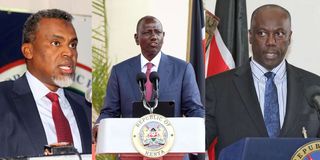Return to spy roots: Ruto nominates Noordin Haji for top NIS role

DPP Noordin Haji, President William Ruto and Philip Kameru.
President William Ruto has nominated Director of Public Prosecutions (DPP) Noordin Haji as the next National Intelligence Service (NIS) director-general.
The move by the President comes ahead of the retirement of Major-General (Rtd) Philip Kameru, who has been at the helm of the intelligence agency since 2014.
In a communication by the Head of Public Service Felix Koskei, President Ruto said the nomination of Mr Haji is meant to facilitate a smooth transition at the intelligence agency.
“It is notified that His Excellency the President has, in accordance with Section 7(1) of the National Intelligence Service Act, nominated Mr Noordin Haji for appointment as the director-general of the National Intelligence Service,” read in part the communication.
The head of state has transmitted Mr Haji’s name to the National Assembly for consideration by Parliament once they resume from recess next month.
Should his nomination be approved by the MPs, Mr Haji will return to the NIS after a five-year stint at the office of the Directorate of Public Prosecutions.
Before becoming the nation’s apex prosecutor, Mr Haji served as the deputy director of the counter-organised crime unit within the NIS.
The University of Wales alumnus joined the public service in January 2000 as a State counsel at the office of the Attorney General.
Completes the shakeup
The nomination of Mr Haji now completes the shakeup in the security agencies in the country that has seen the directorate of criminal investigations and the National Police Service also get new bosses.
The changes saw Inspector General of Police Hillary Mutyambai replaced with Japhet Koome, after requesting to serve the remainder of his four-year term on leave on account of deteriorating health, and Mohamed Amin take over the reins at the DCI from George Kinoti.
Months down the line, Chief of the Defence Forces General Robert Kibochi also exited after retirement and he was succeeded by his vice, General Francis Ogolla.
This left Mr Kameru as the last security man standing in the country’s National Security Council (NSC)—the nine-member exclusive club that is the country’s top decision-making organ.
Maj Gen Kameru has been Kenya’s highest-ranking spy since 2014 when President Uhuru Kenyatta appointed him to replace Michael Gichangi.
For his part, Mr Haji was involved in the behind-the-scenes negotiations that resulted in the bipartisan talks to end hostility between President William Ruto and opposition Azimio la Umoja One Kenya Coalition leader Raila Odinga.
ODM Deputy Party Leader Wycliffe Oparanya last month confirmed the central involvement of Mr Haji in the talks, which saw cases filed against opposition leaders dropped unconditionally to set the stage for the start of negotiations.
Mr Oparanya said the opposition did not find it odd that a public servant was involved in political negotiations, given the then widening gulf between Azimio and the government.
“It was not a concern to us at that time because you don’t know the relationship between who was sent and the President. Perhaps the president did it because of the trust he has in Haji,” Mr Oparanya said.
“What is on the table is the most important thing. I’d not waste time on whether he shouldn’t have picked a civil servant.”
The NSC is the heartbeat of Kenya’s safety, as it formulates domestic, foreign and military policies related to national security.
Whenever something, or someone, threatens to create anarchy in the country, it is the NSC that comes up with a formula to bump back.
Responses by the NSC are usually calculated based on intelligence reports, making the NIS one of the institution’s most crucial cogs.
The NSC supervises Kenya’s security organs, civilian and military. Under the NSC Act, the institution is headed by the President.





